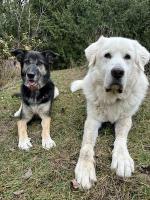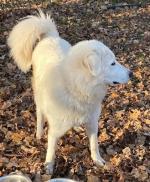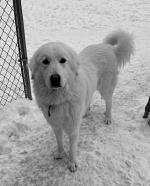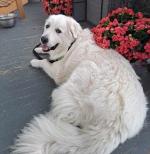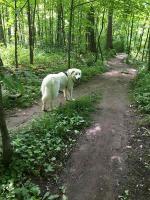Lancelot (A.K.A. Lanny)

Dear sweet Lanny passed away on December 18th, 2020. He will be forever missed by his family. From his family: He was such a gentle soul, and we will miss him forever.
*ADOPTED*
We are so happy to tell you that Lanny is staying with his foster. She absolutely loves him and we couldn't have asked for a better home for him. Congratulations you two!
DOB: January 2011
Lancelot or Lanny is a beautiful 8.5 year old Great Pyrenees neutered male. He is located in Burlington, Ontario.
Lanny has a very sweet disposition. He is friendly and gentle with adults and children. He loves other dogs of all sizes.
He enjoys walks and trips to the off leash to socialize! Do be careful of parks since not everyone pays attention to their dogs.
He walks well on leash. He will pull a little if he sees another dog because he is anxious to greet them. This should be averted since not all dogs appreciate being approached by a strange dog.
His former owner said he had food guarding issues. He has not displayed this with his foster family. He is fed raw.
Lanny enjoys being brushed which is necessary several times a week to get and keep his coat in good condition.
Lanny’s foster family is working on getting him comfortable with a crate and nail clippers. This is a work in progress.
He stresses during thunderstorms so getting him crate- trained will provide him with a sense of security in these situations. Here are some other tips on helping your dog feel safe.
He will stress a little by pacing and barking when left alone. Crating him will help him feel secure until he is well-settled into his new home.
Lanny has a spinal condition called Degenerative Myelopathy (DM). His condition has improved while in foster care due to good quality raw food and regular exercise. This beautiful boy is a pleasure to be with and care for!
They are beautiful dogs with great temperaments given the right breeding, socialization, care including diet and training. Dogs are a lifelong commitment. If your dog requires critical vet care, make sure you are able to go forward with that. This is not the breed for most people.
BARKING: They bark more than most dogs and neighbours do complain. That is a common reason for people surrendering their Pyrs (they didn’t do their research). Their bark is what deters predators and it is instinct to them. That and marking their territory. To take away their bark is to take away who they are. The barking can be managed to some degree but it takes time, patience and consistency with positive-reinforcement training. If you don’t like barking, they are not the dog for you.
CONTAINMENT: Pyrs love to hang out outside and their instinct is to wander. Therefore, they require at least a 6-foot secure fence in a large yard in which they can play, run and watch over. Some have been know to scale any height of fencing. No tie outs for these guys. It can lead to aggression since they cannot fully watch over their territory. If they are out all day, as they usually prefer, they need shelter from the elements. And, no shock or prong collars or invisible fencing.
DIGGING: They dig holes in your garden to stay cool in summer so you’ll want to set aside some garden for them. If you don't want to do this, this is not the dog for you.
DIET: Raw is the species-appropriate diet. They eat 2%-3% of the ideal body weight. Start them out on one protein until they are used to it and gradually add another.
Raw food primer. There is also an excellent facebook page on raw feeding and dog health.
DOGS: If you want more than one dog in the home or working, we always recommend two dogs of the opposite sex. Two males or two females do not always see eye-to-eye and fights will ensue in some cases, but not all.
EXERCISE: They require regular walks and hikes, of course, so they get out and see the world to keep them interested in life. They must be leashed because they will wander. Again, they have been specifically bred to wander with sheep as they watch over them without human intervention. We do not recommend dog parks since not everyone pays attention to dog body language and fights can ensue.
GROOMING: Working and companion dogs must be groomed. They require a daily grooming with a slicker brush, and a good weekly grooming to keep them mat free and their skin healthy (hence, pain free from the pulling of mats as they move), and cutting their nails including their dew claws every couple of weeks to a month. NEVER have their dew claws removed. This is a barbaric practice. Simply keep the dews trimmed.
They molt twice a year and shed all year round so your vacuum stays full. NEVER shave a Pyr. Their coats keep them cool in summer. They lose their undercoat, leaving just guard hairs–the guard hairs protect your dog from sunburn and insulate them against heat, as well as allowing air to circulate to keep the skin cool–and warm in winter–their undercoat grows close to the skin to keep your dog warm and dry. This system only works if you groom your dog regularly. If you don’t like grooming, take your dog to a master groomer. If you don’t want to, this isn’t the dog for you.
TRAINING: They require a lot of socialization as pups onward with people and other dogs. They also require positive-reinforcement training (a trainer who shows you how to work with a clicker). Pyrs, nor any dogs, take kindly to any kind of punishment. Always use positive-reinforcement training. It will lead to aggression. Susan Garrett and Karen Pryor are great website resources.
It’s important to work with dogs as if in a dance and you are leading. Rewards for good behaviour and redirect for unwanted behaviour. It’s up to you to make them a good canine citizen. When engaging a trainer, ensure they use positive-reinforcement training to show you how to work with your dog. Never send a dog away for training. If you are not ready to work with a dog, this is not the dog for you.
To train a Pyr is not like training some other breeds. They are not eager-to-please and just as soon walk away from you than do as you say. They were bred by man to be used as guardian livestock dogs because they do not require human intervention to tell them how to do their job. Lots of patience, consistency and time is required to work with them. If you want an obedient dog and do not have the time for training, this is not the dog for you.
TRAINING FOR LIVESTOCK: There are a few who just want to be a companion dog. Most are natural guardian dogs of livestock. Yes, it is instinct. However, you must introduce your dog to any livestock slowly. This means leashing your dog to you as you work about the animals and barns so they get used to them. When you are not there, keep them penned near the animals so they get used to them. Fowl can be difficult for dogs because of how they move but it can be done. It will take at least a month for a Pyr to get used to the animals, maybe less. You’ll know when they are ready, and the dog will take it from there.
WHY ARE THEY SURRENDERED: There are those in need of a home because someone didn’t realize they would get so big, bark so much (complaints from neighbours), leave so much hair in the house, wander, and require work. There are also those whom people want to surrender for aggression but we do not knowingly take those dogs in. These dogs usually come from farmers, backyard breeders and pet shops (puppy mills) where genetics are unknown by the ‘breeders’. Combine this with lack of socialization and handling by many many different people in the crucial first thirteen weeks of their lives, and by the time they start to mature, aggression can set in.
Many, not all, of these dogs are not 'perfect' when they come to us. Many people see that cute puppy and/or a Pyr someone had on the street and have to have one. The dog looked so wonderful and just 'perfect' but they didn't do their research or the training. They acquire the dog from a farmer/backyard breed/pet store (puppy mill) where genetics are unknown and that crucial socialization and handling with many many many different people in their first 13 weeks of puppyhood was not done. Note that the 'good' Pyrs are ones with whom people have worked with a lot and do ongoing training with them and they come from reputable breeders. They don't come 'perfect'. If you aren't ready to work with a dog 24/7 with consistency and patience, you should not have a dog.
It is very important to do your research on any breed before deciding if they are a good match for your family. Please start here:
Are Pyrs a good match for your family?
We never want to see these dogs fail so it's important that children learn how to behave with dogs and that parents never leave their children alone with a dog. Here is a link on that subject:
Children and Dogs
Breaking News
-
Courtesy - Bear
Apr 09, 25 09:09 AM
Bear DOB: October 2018 Location: Midland, Ontario Pyr/Maremma? mix Single family home with a large securely-fenced property or a hobby farm. Purchased/adopted -
Courtesy Post - Willow
Apr 09, 25 09:07 AM
DOB: March 26th, 2022 Location: London Ontario Cross Pyr/Collie Obtained her privately through a friend. How long have you had her? 10 months Spayed -
Lucy
Apr 09, 25 09:06 AM
*Foster-to-Adopt* or *Foster* DOB: January 3, 2024 Location: Acton, Ontario She will need a single-family home with a securely fenced yard of at least -
Remi
Apr 09, 25 07:44 AM
Location: Acton, Ontario DOB: February 2024 This sweet white fluffy Remi has a sad story. Remi, while his family was in the midst of moving, escaped and -
Grieving Dog
Apr 04, 25 06:17 PM
Background: I am seeking some feedback if anyone has had experience with bonded pairs. Thank you! We have been fortunate to love 2 x almost 10 year -
Leo
Mar 12, 25 06:32 AM
*ADOPTED* DOB: September 2023 (almost 1.5-years-old) Location: Acton, ON Single family home with a securely fenced yard required. This sweetheart was -
Buster
Mar 10, 25 03:36 PM
*Buster is going back to his original family as things have brightened up in their lives and he'll have a wonderful life on acreage.* Buster had to come -
Courtesy - Maya
Jan 08, 25 05:35 PM
*ADOPTED* Location: Dunnville, ON DOB: Jan. 3, 2021 (3.5 years) Spayed Companion Dog, Pyr mix Good with children. Single family home. Raw diet (species-appropriate)












